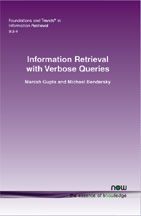Information Retrieval with Verbose Queries
By Manish Gupta, Microsoft, Hyderabad, India, gmanish@microsoft.com | Michael Bendersky, Google, USA, bemike@google.com
Abstract
Recently, the focus of many novel search applications has shifted from short keyword queries to verbose natural language queries. Examples include question answering systems and dialogue systems, voice search on mobile devices and entity search engines like Facebook’s Graph Search or Google’s Knowledge Graph. However the performance of textbook information retrieval techniques for such verbose queries is not as good as that for their shorter counterparts. Thus, effective handling of verbose queries has become a critical factor for adoption of information retrieval techniques in this new breed of search applications. Over the past decade, the information retrieval community has deeply explored the problem of transforming natural language verbose queries using operations like reduction, weighting, expansion, reformulation and segmentation into more effective structural representations. However, thus far, there was not a coherent and organized survey on this topic. In this survey, we aim to put together various research pieces of the puzzle, provide a comprehensive and structured overview of various proposed methods, and also list various application scenarios where effective verbose query processing can make a significant difference.
Information Retrieval with Verbose Queries
Information retrieval with verbose natural language queries has been generating a lot of interest in recent years. The focus of many novel search applications has shifted from short keyword queries to verbose queries. Examples include question answering systems and dialogue systems, voice search on mobile devices, and entity search engines like Facebook’s Graph Search or Google’s Knowledge Graph. However, the performance of textbook information retrieval techniques for such verbose queries is not as good as that for their shorter counterparts. Thus, effective handling of verbose queries has become a critical factor for adoption of information retrieval techniques in this new breed of search applications. Over the past decade, the information retrieval community has deeply explored the problem of transforming natural language verbose queries using operations like reduction, weighting, expansion, reformulation and segmentation into more effective structural representations.
Information Retrieval with Verbose Queries is the first monograph to provide a coherent and organized survey on this topic. It puts together the various research pieces of the puzzle, provides a comprehensive and structured overview of diverse proposed methods, and lists several application scenarios where effective verbose query processing can make a significant difference.
Information Retrieval with Verbose Queries is a very timely reference on this important topic. It is entirely based on previously published research and publicly available datasets and as such, it should prove useful for both practitioners and academic researchers interested in reproducing the reported results.
